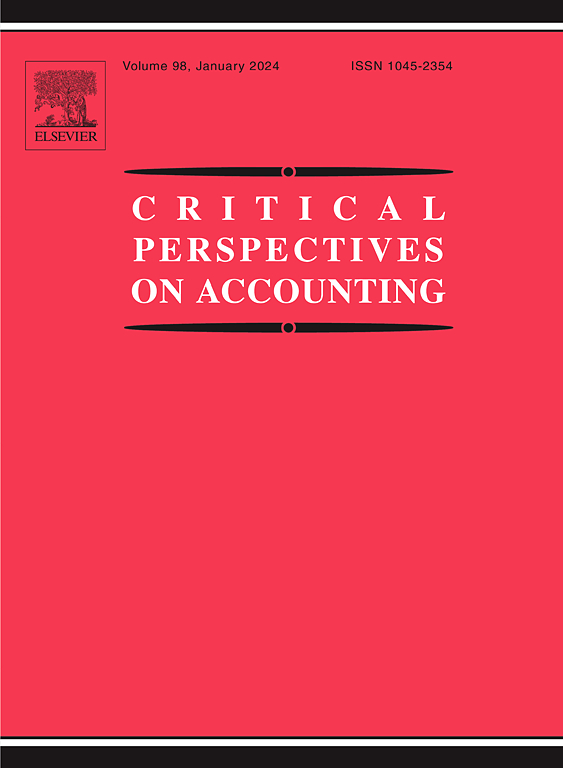The translucence of transparency: Extractive industry beneficial ownership disclosure as an emerging transparency regime
IF 5.7
2区 管理学
Q1 BUSINESS, FINANCE
引用次数: 0
Abstract
This study explores the nature and limits of transparency in the context of the Extractive Industry Transparency Initiative’s beneficial ownership regime. To do this, we draw on Ball’s (2009) three transparency metaphors – public value or norm of behaviour, openness, and complexity – to frame our study and conceptualise transparency as an ambiguous and ambivalent concept connoting light and darkness, clarity and opacity. Empirically, we draw on diverse country-level data (supplemented by company-level data to highlight exemplars) from the period between 2013 and 2021. Our findings show how the beneficial ownership regime’s intersection with the wider political culture provides a space wherein the nature of transparency and the resultant visibilities and invisibilities are negotiated and contested and eventually compromised. We conceptualise this space as a zone of in-betweenness, or translucence, and represent it as an opacity–transparency continuum. As such, what is revealed is the social construction of translucence – a state in which there is neither full transparency nor complete opaqueness but, rather, something in-between. Our findings also highlight how resistance – in both subtle and confrontational forms –influences placement within this zone of in-betweenness (translucence).
透明度的半透明:采掘业实益所有权披露作为一种新兴的透明度制度
本研究探讨了采掘业透明度倡议的实益所有权制度背景下透明度的性质和局限性。为了做到这一点,我们借鉴了Ball(2009)的三个透明度隐喻——公共价值或行为规范、开放性和复杂性——来构建我们的研究,并将透明度概念化为一个模糊和矛盾的概念,暗示着光明和黑暗、清晰和不透明。从经验上看,我们利用了2013年至2021年期间的不同国家层面的数据(辅以公司层面的数据以突出范例)。我们的研究结果表明,受益所有权制度与更广泛的政治文化的交集如何提供了一个空间,在这个空间中,透明度的本质以及由此产生的可见性和不可见性是可以协商、争议并最终妥协的。我们将这个空间概念化为一个介于两者之间或半透明的区域,并将其表示为一个不透明-透明的连续体。因此,揭示的是半透明的社会建构——一种既不是完全透明也不是完全不透明的状态,而是介于两者之间的东西。我们的研究结果还强调了阻力——无论是微妙的还是对抗的形式——是如何影响这个中间区域(半透明)的放置的。
本文章由计算机程序翻译,如有差异,请以英文原文为准。
求助全文
约1分钟内获得全文
求助全文
来源期刊

Critical Perspectives on Accounting
BUSINESS, FINANCE-
CiteScore
9.40
自引率
7.80%
发文量
91
期刊介绍:
Critical Perspectives on Accounting aims to provide a forum for the growing number of accounting researchers and practitioners who realize that conventional theory and practice is ill-suited to the challenges of the modern environment, and that accounting practices and corporate behavior are inextricably connected with many allocative, distributive, social, and ecological problems of our era. From such concerns, a new literature is emerging that seeks to reformulate corporate, social, and political activity, and the theoretical and practical means by which we apprehend and affect that activity. Research Areas Include: • Studies involving the political economy of accounting, critical accounting, radical accounting, and accounting''s implication in the exercise of power • Financial accounting''s role in the processes of international capital formation, including its impact on stock market stability and international banking activities • Management accounting''s role in organizing the labor process • The relationship between accounting and the state in various social formations • Studies of accounting''s historical role, as a means of "remembering" the subject''s social and conflictual character • The role of accounting in establishing "real" democracy at work and other domains of life • Accounting''s adjudicative function in international exchanges, such as that of the Third World debt • Antagonisms between the social and private character of accounting, such as conflicts of interest in the audit process • The identification of new constituencies for radical and critical accounting information • Accounting''s involvement in gender and class conflicts in the workplace • The interplay between accounting, social conflict, industrialization, bureaucracy, and technocracy • Reappraisals of the role of accounting as a science and technology • Critical reviews of "useful" scientific knowledge about organizations
 求助内容:
求助内容: 应助结果提醒方式:
应助结果提醒方式:


